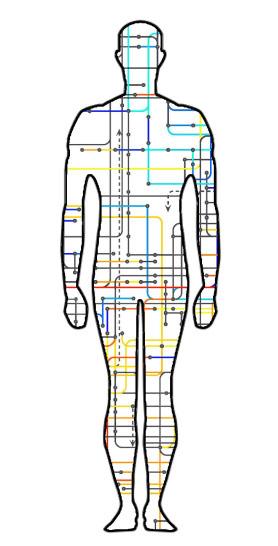
Systems Biology is an approach to study the complexity of biological systems. It is a biology-based interdisciplinary field of study that focuses on complex interactions within biological systems. Computational and mathematical modeling are combined with biological data and data science. Datasets are typically large and contain information on many biological parameters and variables, such as genes, proteins and metabolites.
Depending on the research question or application, different mathematical and computational techniques are used and developed. An important strength is our combination of machine learning with dynamic modelling. Data comes from experimental and clinical studies, executed in close collaboration with clinical research institutes and hospitals.
We reconstruct human metabolism and its multi-level regulation in computer models. Metabolism is studied and modeled at different levels: intracellular pathways, interactions between organs and tissues, and the processes that control metabolism. In particular, we study the interaction of glucose and lipids in energy metabolism of liver, intestine, adipose tissue and skeletal muscle to discover disease mechanisms underlying chronic, cardio-metabolic diseases associated with obesity and an unhealthy lifestyle, such as Metabolic Syndrome and Type 2 Diabetes.
Four themes
1. Dynamic and personalized models of metabolism and its regulation (including ‘digital twinning’, personalized medicine and nutrition).
Example: Meessen et al (2020) Model-based data analysis of individual human postprandial plasma bile acid responses indicates a major role for the gallbladder and intestine
Student thesis: A physiology based glucose-insulin-GLP-1-model
2. Reconstruction and application of genome-scale metabolic network models for multi-omics data integration.
Example: Cabbia, et al (2020) A Distance-Based Framework for the Characterization of Metabolic Heterogeneity in Large Sets of Genome-Scale Metabolic Models
Student thesis: Network based analysis of human hepatic cells
3. Clinical data analytics of longitudinal patient data using computational statistics and machine learning for medical decision support.
Example: Van Loon et al (2020) Metabolic Health Index (MHI): Assessment of Comorbidity in Bariatric Patients Based on Biomarkers
Student thesis: Divergentie in de Nederlandse zorg door te veel richtlijnen
4. Methods and algorithms for biology-based models combined with machine learning.
Example: Van Riel, et al (2021) Metabolic Modeling Combined With Machine Learning Integrates Longitudinal Data and Identifies the Origin of LXR-Induced Hepatic Steatosis
Student thesis: Expanding ADAPT to model heterogeneous datasets and application